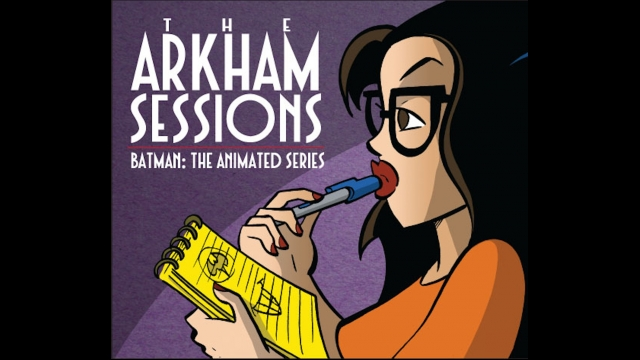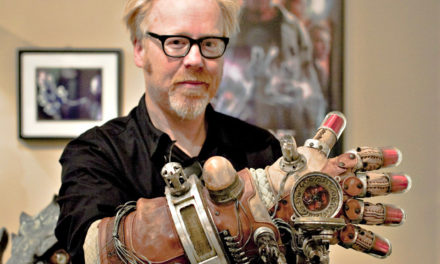I discovered the The Arkham Sessions midway through a bout of podcast Wanderlust. I was looking for something unique, original in both design and execution.
Dr. Andrea Letamendi and Brian Ward provided that uniqueness with their weekly psychological analysis of Batman: The Animated Series. The show is funny, accessible, and more universally applicable than the title would imply.
Letamendi (Drea) has a Ph.D. in Clinical Psychology and speaks about psychology and its role in the comic/sci-fi narrative at all the big conventions, including San Diego Comic-Con. She’s been interviewed by just about every big media outlet you can think of, and she was Barbara Gordon’s psychologist in DC Comics’ Batgirl no. 16 and no. 20. That’s right; she’s an actual comic book character.
Ward is an award-winning DVD/Blu-Ray producer. In addition to his work in animation and The Arkham Sessions, he writes and directs. “The History of MST3K,” a documentary about Mystery Science Theater 3000 with Joel Hodgson and company, was one of his more notable ventures.
They took a few minutes to chat with me last week about their podcast and the power of comics as a psychological learning tool.
Drea, tell me a little about your blog Under the Mask and your mission.
A: Under the Mask started as a way for me to discuss psychology by applying it to fictional characters. Over the years, I’ve treated a lot of real-life heroes; veterans mostly. And there’s a lot that people need to know about what these people go through. I found it fascinating that there are many parallels between superheroes in comics and real life soldiers. I find that using these fictional characters helps people get interested and the goal with the site has always been to relieve a lot of the stigma that surrounds mental health discussions.
When and how did “the Arkham Sessions” come about?
B: I’ve always known Drea was a huge Batman fan, much like myself. And we’d often get into lengthy conversations about the mental states of several of the villains in the Rogues Gallery and even Batman and Robin themselves. But when I saw her in the documentary Necessary Evil: Super-Villains of DC Comics, I knew that she’d be perfect for a weekly podcast literally going from one episode to the next, analyzing each character just as she would a patient. Luckily, she said, “yes!” And now, here we are.
A: The show may have been created to simply give youths a half hour’s worth of adventure every afternoon. But Batman: The Animated Series actually dealt with darker and psychologically deeper themes such as child abduction, childhood trauma, disfigurement, identity amnesia, bullying, eyewitness testimony, terrorism, and torture. As Batman encounters more moral distress, internal conflict and social struggles, it’s clear he’s a little different than in previous versions, in that, he is self-doubting and fallible, i.e. human. These are some of the things I’m really enjoying digging into throughout this process.
Drea, I noticed you recently lectured on comics teaching psychological resilience. What’s the fundamental message you try to convey in those kind of engagements?
As an educator and manager at a children’s mental health agency, I often work with other psychologists and mental health practitioners. In these lectures, I use fictional narratives like comics to discuss topics like trauma, recovery and resiliency. In this particular talk, the main message was how to work with children and convey important things about their mental health treatment, such as: “Bad things sometimes happen to good people, and it isn’t their fault. We can’t always control what happens to us, but we can control what we think and how we feel after things happen. It’s the meaning of the trauma that we have control over. Finally, it takes the help of others to get better.”
In general, do you see a correlation between the personalities of Gothamites and those who fan out over The Caped Crusader?
B: I would say, “yes,” only in that they/we all need Batman in some capacity. I’d hate to think about what my life would be like without a regular dose of the Bat. And I’d really hate to think about what Gotham would be like without him.
Which Batman characters to do you think you share the most psychological traits with?
B: I’m clearly Sherman, the ginger kid in “I’ve Got Batman in My Basement.” Especially if Drea’s take on the story is true. If you’ve not heard that episode of the podcast, you should check it out. Drea will blow your mind with her hypothesis.
A: I relate a lot to officer Renee Montoya. She wasn’t in a lot of episodes, but she stood out for me. Although her ethnicity wasn’t initially made clear or talked about on the show, I immediately recognized her as a strong, Latina woman (she was initially voiced by a Latina actress and later in comics confirmed as having Latina heritage). There is even an early episode of Batman: The Animated Series where she goes against the police force and rescues Batman. She wasn’t a damsel in distress. And it was during a time that she wasn’t there for political correctness, either!
What can we look forward to with “The Arkham Sessions” this year?
B: I think the podcast is getting stronger and stronger with every episode. And now that we’re starting to cover a lot of the villains for their second and third time, we’re starting to look at how much they grow psychologically.
A: And Bruce, too, for that matter. Everyone is being looked at equally. They’re all human characters. They all have flaws. And we’re finding that, whether the writers were conscious of it or not, their characters are, in fact, evolving. Some worse than others.







